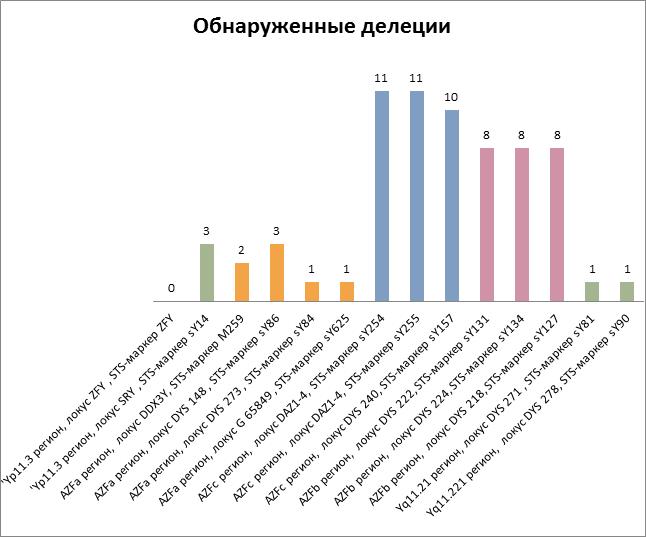Kmn З.Б.Rakisheva, Н.К.Degemerzanova, А.Х. Yerdenova, М.В.Solomadin
MOLECULAR GENETIC DIAGNOSIS IN MALE INFERTILITY
Molecular Genetics Laboratory TreeGene, Kazakhstan, Almaty
The article deals with the genetic causes of male infertility, the detection of which has become possible due to the introduction of molecular genetic techniques of patient examination. The data of our own studies are presented. The results once again confirm the necessity of genetic examination for microdeletions of AZF loci in patients with infertility of unclear genesis and spermatogenesis disorders.
Key words: Male infertility, molecular genetic studies, AZF-microdeletions of the Y chromosome.
The successful development of molecular genetics in recent decades has significantly expanded the diagnosis and treatment of many diseases. Most diseases have a complex multifactorial etiology, where their development is determined by both genetic and epigenetic (exogenous) factors. The reproductive system disorders are also among the multifactorial pathologies. Infertility remains a serious problem in this area.
Infertility affects about 20% of couples of reproductive age, and in half of the cases it is caused by male reproductive dysfunction. Spermatogenesis is a complex biological multistep process culminating in the formation of mature male germ cells - spermatozoa. This process is controlled by a large number of genes located on both autosomes and gonosomes (sex chromosomes), particularly on the Y-chromosome. Spermatogenesis disorder can manifest itself as azoospermia (absence of sperm cells in the ejaculate), oligozoospermia (reduced concentration of sperm cells), asthenozoospermia (reduced sperm motility) and teratozoospermia (major number of sperm cells with an altered shape). Approximately 30-40% of the causes of male infertility are not detected by traditional clinical and laboratory diagnostic methods, including cytogenetic analysis. The introduction of molecular genetic methods makes it possible to identify another cause of male infertility - Y-chromosome microdeletions.
The results of molecular genetic studies of the Y chromosome in spermatogenesis disorders suggested that one or more genes responsible for azoospermia factors (AZF) are located on the Y chromosome, and subsequently three non-overlapping regions (AZFa, AZFb and AZFc) were identified on the long arm of the Y chromosome. Molecular analysis of deletions of these regions led to the identification of a series of genes that may be important for spermatogenesis. For example, the AZFc deletion region contains several gene families expressed in the testis, including the DAZ gene (lost in azoospermia). deleted in azoospermia). AZFc deletions occur de novo in about 1 in 4,000 men and are caused by recombinations between long repetitive sequences. AZFa and AZFb deletions, although less frequent, are also caused by recombinations. Approximately 2% of otherwise healthy men are infertile because of severe defects in spermatogenesis. Presumably, some of these abnormalities are due to de novo deletions that have occurred. [1]

Over the past two years, we conducted a study of AZF microdeletions of Y-chromosome loci in 95 patients with spermatogenesis disorders of unspecified genesis. The average age of the patients was 30.76 years.

Microdeletions were analyzed on an Applyied Biosystem sequencer for 14 STS markers including the AZFa, AZFb, and AZFc regions using multiplex PCR. Microdeletions were detected in 12.63% of those examined.

These are mainly AZFc-region deletions (51%), followed by AZFb (38%) and the least number of microdeletions in the AZFa-region (11%).

The results are consistent with the literature, according to which AZF-deletions are found in an average of 10% of men with spermatogenesis disorders. [2,].
Detection of Y-chromosome microdeletions makes it possible to establish the genetic cause of spermatogenesis disorders, to avoid unwarranted infertility treatment in men with microdeletions of the AZF locus, and to predict the probability of obtaining spermatozoa for IVF/ICSI. A certain type of microdeletion on the Y chromosome in patients with azoospermia may have prognostic value in terms of the possibility of finding some number of sperm and/or mature spermatids in testicular tissue. Preliminary results show that AZFa and AZFb deletions are more associated with failed sperm retrieval attempts, whereas mature spermatids can be found in 71% of patients with standard AZFc-microdeletions. [2,3].
Thus, men with idiopathic infertility should not only be karyotyped for the presence of chromosomal aberrations detected by traditional cytogenetic methods, but also a molecular study of the Y chromosome with genetic counseling before starting assisted reproductive technologies.
List of references:
- Robert L. Newsbaum, Roderick R. McInnes, Huntington F. Willard. Medical Genetics. - Moscow: GEOTAR-Media, 2010. - 624с.
- Chernykh V.B. AZF deletions - a frequent genetic cause of infertility in men: current state of research. Problems of Reproduction. - 2009. - Т. 15. -№1. - С. 10-15.
- Degemerzanova N.K., Solomadin M.V. AZF-microdeletions of Y-chromosome. Molecular genetic studies in male infertility available in Kazakhstan. KMJ (Kazakhstan Medical Journal). - 2012. -№6 (30). - С. 86-89.
ТҮYINDEME
EREK BEDEULIGINDEGIN MOLECULALIK-GENETICIK DIAGNOSTIKALAU
З. B. Rakisheva, N.K. Degemerzanova, A.Kh. Erdenova, M.V. Solomadin
Molecular and genetic laboratory TreeGene
Kazakhstan, Almaty
If the genetic technology is not available, the genetic technology is not available and the molecular-genetic technology is not available. This technology is not available to the public. The genetic characteristics of spermatogenesis and sperm production are not affected by the scientific findings of the AZF locusts and microdeletions.
The following are examples: genetic integrity, molecular genetic integrity, and Y-chromosomal AZF microdeletions.
SUMMARY
MOLECULAR GENETICS DIAGNOSIS IN MALE INFERTILITY
Z. B. Rakisheva, N.To.Daemarteba, A.H. Erdenova, M.V. Solomatin
Molecular genetic laboratory TreeGene
Kazakhstan, Almaty
The article discusses the genetic causes of male infertility, the identification of which was made possible
thanks to the introduction of molecular genetics technologies for examination of patients. The data of research.
The results obtained confirm the necessity of genetic screening for microdeletions of AZF loci in patients with
unexplained infertility and impaired spermatogenesis.
Key words: male infertility, molecular genetic studies, AZF-microdeletions of the Y-chromosome.








